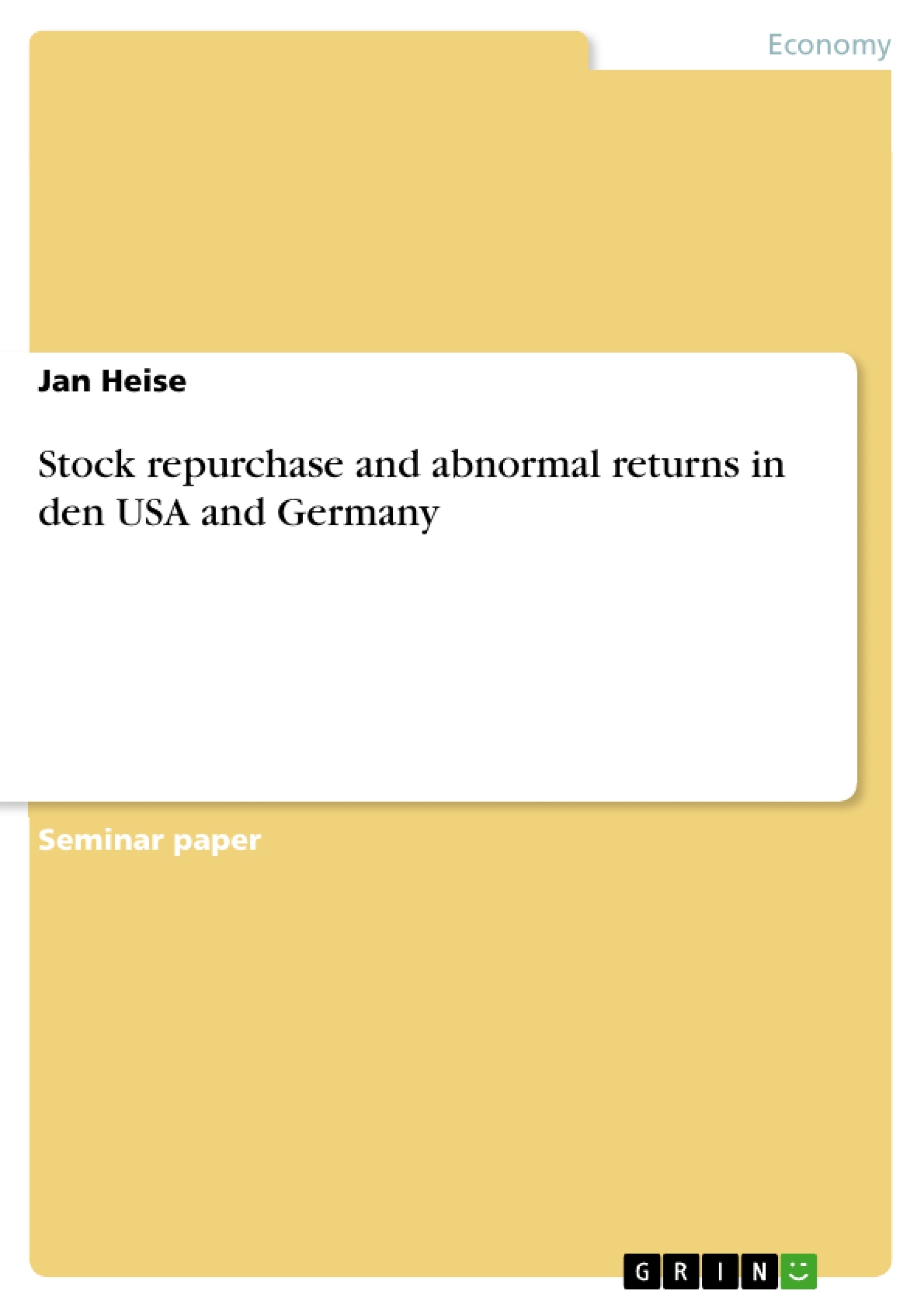Two of the most prominent trends in corporate finance in the U.S. during the past 15 years are the growing popularity of share repurchases and the decreasing popularity of dividends. Repurchasing stocks is another way for managers to distribute money to shareholders, thus it plays an equivalent role as dividend payments.
Consistent with Grullon and Michaely (2002) U.S. corporations distribute cash by rather repurchasing stock than by paying dividends to shareholders. Fama and French (2001) argue in the same direction. Their study provides evidence that the proportion of corporations paying cash dividends fell from 66.5% in 1978 to 20.8% in 1999. According to Grullon’s (2000) findings the total of share repurchases exceeded the total of dividend payment for industrial firms in 1998.
In Germany share repurchases were highly restricted until 1998. As a consequence the volume of repurchases was small. The popularity of repurchases in the U.S. and in other countries was a strong argument for lifting the restrictions. These days, German companies announce buybacks regularly.
Although capital markets in the USA and Germany are efficient the impact of stock repurchase programs differ, resulting in higher stock performance after buyback announcements in Germany than in the USA.
Inhaltsverzeichnis (Table of Contents)
- Introduction
- Value Creation and Reduction of the Number of Shares
- Economic Motivation for Stock Repurchase
- Excess Capital Hypothesis
- Undervaluation Hypothesis
- Optimal Leverage Ratio Hypothesis
- Management Incentive Hypothesis
- Takeover Deterrence Hypothesis
- Abnormal Returns around Stock Repurchase
- Germany's institutional setting
- Abnormal Returns in the U.S. and Germany
Zielsetzung und Themenschwerpunkte (Objectives and Key Themes)
This paper analyzes the impact of stock repurchases on earnings per share and investigates the economic motivations behind stock buybacks in the U.S. and Germany. The study compares the differences in institutional settings and the resulting abnormal returns following buyback announcements in both countries. The paper emphasizes the importance of considering market imperfections and asymmetric information in understanding the motives for stock repurchases.
- The impact of stock repurchases on earnings per share
- The economic motivations behind stock buybacks
- The differences in institutional settings between the U.S. and Germany
- The abnormal returns following buyback announcements in both countries
- The role of market imperfections and asymmetric information in stock repurchase decisions
Zusammenfassung der Kapitel (Chapter Summaries)
- Introduction: This chapter provides an overview of the growing trend of stock repurchases in the U.S. and the increasing popularity of buybacks in Germany. It highlights the role of repurchases as an alternative to dividend payments and discusses the differences in stock performance following buyback announcements in the U.S. and Germany.
- Value Creation and Reduction of the Number of Shares: This chapter explores the impact of stock repurchases on earnings per share (EPS). It examines the mechanics of how repurchases can lead to higher EPS and discusses the potential for creating value through this strategy. However, it also acknowledges the irrelevance of stock repurchases in a perfectly efficient market, according to Modigliani and Miller's (1958) Irrelevance Theorem.
- Economic Motivation for Stock Repurchase: This chapter focuses on the various economic motives behind stock buybacks, particularly in the presence of market imperfections and asymmetric information. It presents five key hypotheses: (1) Excess Capital Hypothesis, (2) Undervaluation Hypothesis, (3) Optimal Leverage Ratio Hypothesis, (4) Management Incentive Hypothesis, and (5) Takeover Deterrence Hypothesis. The chapter explores the theoretical foundation for these hypotheses and their implications for stock repurchase decisions.
Schlüsselwörter (Keywords)
The paper focuses on the key concepts of stock repurchases, earnings per share, market efficiency, asymmetric information, and corporate finance. It examines the motivations behind stock buybacks and analyzes the impact of repurchases on stock performance in the U.S. and Germany. Furthermore, the study considers the institutional differences between these countries and explores how they influence the outcomes of stock repurchase programs.
Frequently Asked Questions
Why are stock repurchases becoming more popular than dividends in the U.S.?
Managers use repurchases as a flexible way to distribute excess cash to shareholders, often preferred over dividends which are seen as a long-term commitment.
How do stock repurchases affect Earnings Per Share (EPS)?
By reducing the total number of outstanding shares, a stock repurchase can increase EPS, assuming the company's net income remains stable or grows.
What is the "Undervaluation Hypothesis" for stock buybacks?
This hypothesis suggests that managers initiate buybacks when they believe the market is undervaluing their company's stock, signaling confidence to investors.
How does the institutional setting for repurchases differ in Germany?
Stock repurchases were highly restricted in Germany until 1998. Since then, they have become regular occurrences, often resulting in higher abnormal returns than in the U.S.
What is the "Takeover Deterrence Hypothesis"?
It suggests that companies may repurchase their own shares to increase the stock price or consolidate control, making the firm a less attractive or more expensive target for hostile takeovers.
- Citation du texte
- Jan Heise (Auteur), 2006, Stock repurchase and abnormal returns in den USA and Germany, Munich, GRIN Verlag, https://www.grin.com/document/84635



